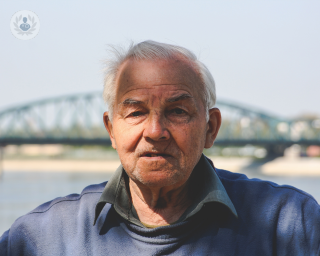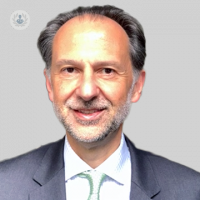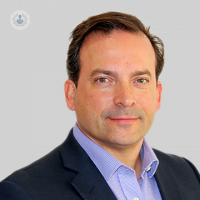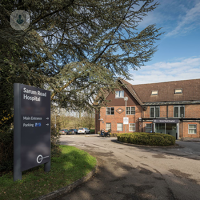What is a prostatectomy?
A prostatectomy is a surgical procedure to remove all or part of the prostate.
The prostate is a walnut-sized gland only found in men, located between the bladder and the penis. It can be afflicted by a number of conditions, including prostate cancer.
A simple prostatectomy is a procedure that only removes part of the prostate. A radical prostatectomy involves removing the entire prostate, along with the seminal vesicles and vas deferens. It is usually only used to treat malignant prostate cancer. A prostatectomy is performed by a specialist urologist.
Why is a prostatectomy done?
Several conditions can be treated with a prostatectomy.
Simple prostatectomies are generally only performed for benign conditions, while radical prostatectomies are performed for more serious benign conditions and malignant cancer.
Your doctor may recommend a prostatectomy for the following conditions:
- Benign prostatic hypertrophy (BPH) (otherwise referred to as benign prostate enlargement).
- Acute urinary retention.
- Recurrent urinary tract infections (UTIs).
- Prostate cancer.
You may recognise the signs of a problem with the prostate if you experience the following symptoms:
- frequent urination with little urine
- urgent need to urinate during the night (nocturia)
- difficulty starting to urinate
- low urine flow
- dripping at the end of urination
- sensation that the bladder hasn’t fully emptied even if you have urinated.
What does prostatectomy consist of?
Prostatectomy can be performed in one of a few different ways:
- Open surgery – the surgeon makes a large incision in the patient’s abdomen, allowing them to reach the prostate in order to cut it (or part of it) out.
- Keyhole surgery – a minimally invasive approach, this involves cutting 5-6 small incisions in the patient’s abdomen, through which surgical tools can be passed, including a tiny light and camera so that the surgery can be performed without cutting the patient open. This can be done by hand or the surgeon may use robotic assisted surgery techniques.
Preparation for prostatectomy
Prostatectomy does not usually require any special preparation. However, it is possible that the urologist will ask the patient to not drink any fluid in the hours leading up to the surgery. The patient will be given a general anaesthetic prior to the procedure.
Care after the intervention
After prostatectomy, the patient usually stays in the hospital for 7-10 days. The total recovery will take a few weeks.
While in the hospital, the patient is given pain medication and a catheter is passed up the penis to allow urine to pass out of the bladder and into a bag that can be carried round. The catheter stays in place while the area heals, with most patients keeping it in while they go home and having it removed a few weeks later.
The patient will be encouraged to walk around the hospital to prevent blood clots. The team of doctors and nurses will advise them on what to eat and drink, as well as how to look after their catheter.
The patient may experience fatigue, constipation, and an inability to get an erection while they recover. Any unexpected consequences of the surgery or any doubts should be reported to the doctor.
03-25-2013 10-16-2023Prostatectomy (prostate removal)
What is a prostatectomy?
A prostatectomy is a surgical procedure to remove all or part of the prostate.
The prostate is a walnut-sized gland only found in men, located between the bladder and the penis. It can be afflicted by a number of conditions, including prostate cancer.
A simple prostatectomy is a procedure that only removes part of the prostate. A radical prostatectomy involves removing the entire prostate, along with the seminal vesicles and vas deferens. It is usually only used to treat malignant prostate cancer. A prostatectomy is performed by a specialist urologist.
Why is a prostatectomy done?
Several conditions can be treated with a prostatectomy.
Simple prostatectomies are generally only performed for benign conditions, while radical prostatectomies are performed for more serious benign conditions and malignant cancer.
Your doctor may recommend a prostatectomy for the following conditions:
- Benign prostatic hypertrophy (BPH) (otherwise referred to as benign prostate enlargement).
- Acute urinary retention.
- Recurrent urinary tract infections (UTIs).
- Prostate cancer.
You may recognise the signs of a problem with the prostate if you experience the following symptoms:
- frequent urination with little urine
- urgent need to urinate during the night (nocturia)
- difficulty starting to urinate
- low urine flow
- dripping at the end of urination
- sensation that the bladder hasn’t fully emptied even if you have urinated.
What does prostatectomy consist of?
Prostatectomy can be performed in one of a few different ways:
- Open surgery – the surgeon makes a large incision in the patient’s abdomen, allowing them to reach the prostate in order to cut it (or part of it) out.
- Keyhole surgery – a minimally invasive approach, this involves cutting 5-6 small incisions in the patient’s abdomen, through which surgical tools can be passed, including a tiny light and camera so that the surgery can be performed without cutting the patient open. This can be done by hand or the surgeon may use robotic assisted surgery techniques.
Preparation for prostatectomy
Prostatectomy does not usually require any special preparation. However, it is possible that the urologist will ask the patient to not drink any fluid in the hours leading up to the surgery. The patient will be given a general anaesthetic prior to the procedure.
Care after the intervention
After prostatectomy, the patient usually stays in the hospital for 7-10 days. The total recovery will take a few weeks.
While in the hospital, the patient is given pain medication and a catheter is passed up the penis to allow urine to pass out of the bladder and into a bag that can be carried round. The catheter stays in place while the area heals, with most patients keeping it in while they go home and having it removed a few weeks later.
The patient will be encouraged to walk around the hospital to prevent blood clots. The team of doctors and nurses will advise them on what to eat and drink, as well as how to look after their catheter.
The patient may experience fatigue, constipation, and an inability to get an erection while they recover. Any unexpected consequences of the surgery or any doubts should be reported to the doctor.


Robotic surgery in prostatectomy: Advancing precision and recovery
By Professor Prokar Dasgupta OBE
2024-11-21
In the realm of medical innovation, robotic surgery stands out as a revolutionary approach, particularly in the treatment of prostate cancer through prostatectomy. At the forefront of this advancement is the da Vinci Surgical System, a sophisticated technology that has redefined surgical precision and patient outcomes. In his latest online article, renowned consultant urologist and robotic surgeon Professor Prokar Dasgupta offers his expert insight into this procedure. See more


Radical prostatectomy: Indications and methods
By Mr Neil Haldar
2024-11-21
Radical prostatectomy surgery is often carried out for patients with prostate cancer. It’s an extremely effective procedure which like most surgeries has some risks involved. Leading urologist, Mr Neil Haldar, explains the indications for radical prostatectomy surgery and what the differences between a prostatectomy and a radical prostatectomy are. See more


Radical prostatectomy: survival rate
By Mr Neil Haldar
2024-11-20
If you may be undergoing a radical prostatectomy soon for prostate cancer you will want to know what the survival rate is as well as information about further treatment after the surgery. We spoke to leading urologist, Mr Neil Haldar to find out more information about the procedure and what to expect. See more


All you need to know about robotic prostatectomy
By Mr Philip Charlesworth
2024-11-20
Mr Philip Charlesworth is a renowned urologist in the London & Berkshire area who is one of the leaders in the field with his dedication to prostate cancer and radical prostatectomy. He explains this effort and the importance of the newer technology he is using to save lives. See more
Experts in Prostatectomy (prostate removal)
-
Mr Christopher Anderson
UrologyExpert in:
- Kidney cancer
- Laparoscopy
- Prostate cancer
- Robotic surgery in urology
- Prostatectomy (prostate removal)
- Prostate biopsy
-
Ms Jhumur Pati
UrologyExpert in:
- Cystitis
- Prostatitis
- Circumcision
- Male infertility
- Vasectomy
- Prostatectomy (prostate removal)
-
Mr Marc Laniado
UrologyExpert in:
- HIFU (high-intensity focused ultrasound)
- Prostatectomy (prostate removal)
- Prostate cancer
- Holmium laser (HoLEP)
- NanoKnife
-
Mr Gordon Muir
UrologyExpert in:
- Prostate
- Prostate cancer
- Erectile dysfunction
- Prostatectomy (prostate removal)
- Circumcision
- Frenuloplasty
-
Mr Tim Dudderidge
UrologyExpert in:
- Prostate cancer
- Prostatectomy (prostate removal)
- Benign prostate enlargement
- Robotic surgery in urology
- Cryotherapy for prostate and kidney cancer
- Prostate biopsy
- See all

Sarum Road Hospital - part of Circle Health Group
Sarum Road Hospital - part of Circle Health Group
Sarum Rd, Winchester SO22 5HA
No existe teléfono en el centro.
By using the telephone number provided by TOP DOCTORS, you automatically agree to let us use your phone number for statistical and commercial purposes. For further information, read our Privacy Policy
Top Doctors

The Harley Street Clinic - part of HCA Healthcare
The Harley Street Clinic - part of HCA Healthcare
35 Weymouth Street, London. W1G 8BJ
No existe teléfono en el centro.
By using the telephone number provided by TOP DOCTORS, you automatically agree to let us use your phone number for statistical and commercial purposes. For further information, read our Privacy Policy
Top Doctors

HCA UK at The Shard
HCA UK at The Shard
32 St Thomas Street, SE1 9BS
No existe teléfono en el centro.
By using the telephone number provided by TOP DOCTORS, you automatically agree to let us use your phone number for statistical and commercial purposes. For further information, read our Privacy Policy
Top Doctors
-
Sarum Road Hospital - part of Circle Health Group
Sarum Rd, Winchester SO22 5HA, WinchesterExpert in:
- Vascular Surgery
- Cardiology
- Shoulder surgery
- Hand surgery
- General Surgery
- Orthopaedic surgery
-
The Harley Street Clinic - part of HCA Healthcare
35 Weymouth Street, London. W1G 8BJ, Central LondonExpert in:
- Cancer
- Head and neck cancer
- Cardiology
- Intensive care
- Diagnostic Imaging
- Women’s health
-
HCA UK at The Shard
32 St Thomas Street, SE1 9BS, Central LondonExpert in:
- Vascular Surgery
- Head and neck cancer
- Breast Cancer
- Orthopaedic surgery
- Thoracic Surgery
- Cancer screening clinic
- See all
- Most viewed diseases, medical tests, and treatments
- Undescended testicle (Cryptorchidism)
- Testicular ultrasound
- Minimal access surgery (keyhole surgery)
- NanoKnife
- Vaginal dryness
- Pelvic pain syndrome
- Kidney stones
- Medicolegal
- Women's health
- Robotic surgery








